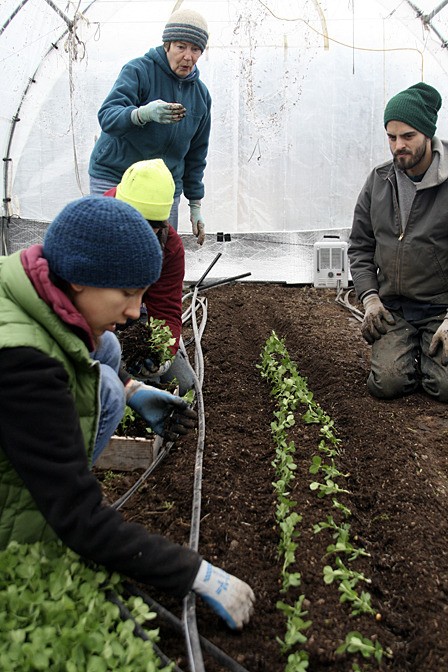It’s planting time and Susan Corning and her team of interns at Synergy Farm are getting down to business like … well, like peas in a pod.
The trio of would-be farmers closely follow Corning’s instructions as they sow row after row of early-season “Cascadia” snap peas in one of Synergy’s many plastic-encased garden plots, gathering insights from their mentor.
“Last year wasn’t a very successful one for a lot of early-season peas,” Corning said. “These tend to do better with our weather and our climate.”
It’s the fourth consecutive year that Susan and her husband Peter, on San Juan Island, have recruited interns and relied on those younger bodies to help keep their enterprise in operation. They offer room, board and a stipend, and provide first-hand knowledge and hands-on experience in the field of agriculture.
It’s the first year, however, that the Cornings have signed onto a brand new “pilot program” designed to breathe new life and legitimacy into a long-standing, though at times awkward, relationship between farm owners, interns and state labor officials.
The Small Farm Internship Pilot Project allows interns at participating farms to get workers’ comp, not available to other interns. It also provides exemptions from minimum wage laws and could negotiate conditions such as room and board, stipends, or other compensation.
The 2010 state legislature authorized the project after hearing concerns that farms weren’t following applicable labor laws for interns and that there were few opportunities for inexperienced people to learn hands-on farming practices. The legislature tasked the Department of Labor and Industries with developing a formula that allows willing interns to work on small farms at less than minimum wage and learn what it takes to run a successful agricultural enterprise in exchange.
In San Juan County, Ron Zee of San Juan Island and John Steward of Maple Rock Farm of Orcas will also participate.
The last two tough years have brought more requests than ever from folks wanting to work on his farm, said Steward.
“There’s this feeling that learning how to grow food is probably a good thing,” he said. “There are a ton of younger folks who are very interested in becoming farmers.”
He will begin the program this summer. Steward is relieved to have the safety net of L&I coverage for his workers, saying most farms rely on interns: “You have to have farm workers to be able to make it.”
“I think the program helps,” he added. “This makes [farms] legitimate, completely up-front. I know a lot of people are just sitting on the sidelines, they’re waiting … It’s not going to continue unless people sign up for it.”
Corning shared similar thoughts about the program, saying, “For the farmer, it finally establishes a category with L & I so you’re not always worried about falling in between the cracks.”
Participating farmers must furnish an accepted curriculum tailored to the type of work their interns perform and track their progress.
The pilot project is aimed specifically at small farms, those that earn less than $250,000 a year, in San Juan and Skagit counties. Labor and Industries hired Katherine Dean to put the pilot program into motion.
A former farm intern and small farm owner who has employed interns, Dean knows well the cracks that concern small farm owners. She said profit margins are thin and labor laws can be complex, confusing and unforgiving. Like any industry, farmers are obligated to have insurance coverage for employees. Formalizing the type of coverage a farm owner must carry is one of the program’s primary benefits.
While momentum may be building, Dean said there’s a degree of entrenched resistance for many down on the farm.
“Part of the reason is that farmers feel over-regulated already,” she said. “They have a tendency to run when they see L & I coming.” Dean believes L & I sincerely wants the project to succeed. She’s due to provide the 2012 Legislature with a report on the project and its progress.
In the meantime, she will be canvassing the islands and looking for recruits with the county Agricultural Resources Committee’s Peggy Bill. To contact her, call 378-2906 or e-mail info@sjcarc.org.
Bill believes the program builds a bridge for a new generation of farmers and, if it’s successful, could be a model that’s replicated across the state and the nation.
“It’s the first of it’s kind,” she said. “People all over the county are watching.
For more information on the pilot project, visit http://goo.gl/Phf6j.




